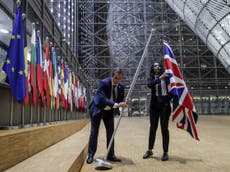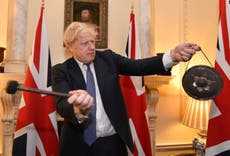It's a long way from the bonhomie of Parliament Square's Brexit rally to the reality of life outside the EU
The fact that EU negotiators tend to speak impeccably fluent English does not prevent nuances being lost in translation

I imagine that committed Remainers spent the evening of Independence Day with a range of emotions – from anger, to sadness, to resignation, to hope.
In a round of media appearances, my initial instinct was to take a conciliatory and positive tone: Brexit is a reality now, and we have to make the best of it. But I did warn that if Boris Johnson's government fails to deliver the promised fruits of Britain’s new freedom and sovereignty, it can expect a serious backlash. EU membership, in some form, could yet resurface as a serious election issue within a decade.
During a TV interview in the middle of the Brexit rally in Parliament Square, I was spotted by the crowd. There were a few less-than-welcoming "f*** offs". But mostly it led to a lot of good-natured banter, handshakes and requests for selfies with people in the Union Jack suits. There is, however, a long way from the bonhomie of that gathering to the reality of agreeing a future relationship with the EU.
My last engagement of the night was taking part in a long radio phone-in alongside a leading Tory Brexiteer in the run-up to our tryst with destiny at 11pm. In the last clutch of calls, a very loud and forceful Englishman rang in, describing himself as a Scottish Nationalist and a Remainer. He crossed swords with a "deliriously happy" lady who had supported Brexit from day one, 47 years earlier. "You called me stupid", "No I didn’t", "You did. I have a degree", "And anyway you are ignorant and arrogant", ‘"No I am not. You don’t get it, do you?" And on and on it went, until the recording of Big Ben's 11 sombre bongs brought merciful release. The scratchy argument was a metaphor for the whole Brexit saga.
Even after the breaking of the new dawn, these arguments will continue, like angry divorcees insisting that they must have the last word on what went wrong. And the disagreements will spill over into the discussions about our future relationship with the EU. The fact that the EU negotiators tend to speak impeccably fluent English does not prevent the nuances being lost in translation.
Take a simple example: the EU insists that any serious trade deal must be accompanied by regulatory alignments to prevent the UK from "undercutting" its standards. By contrast, Boris Johnson insists that there must be no regulatory alignment; Britain is a "sovereign nation" which will not be dictated to by a trade partners. At the same time, the government says it has no wish to dilute EU standards and the overwhelming majority of regulatory standards are, in any event, technical and uncontroversial.
That being the case, there is no real difference between the UK and the EU on this fundamental point – but there is a chasm to bridge in language and in the perception of who is dictating to whom.
There is a similar and potentially very awkward clash to come over the structure of the negotiations. The British government will say that it is asking for very little. It is. A Canadian-style trade agreement – with freedom from most tariffs and quotas, but little else – is indeed a modest ambition in trade policy terms. It seriously disadvantages British exporters relative to the status quo of single market membership and secures no access for many service exporters. But the paradox is that such minimalist agreements are the most difficult to reach. There are more than 200 pages in the EU-Canada agreement, which took many years to negotiate, but only around 20 pages for the agreement with Norway which involves full access to the EU single market.
This paradox can be explained by the metaphor of divorce. A couple may decide to part amicably, live next door to each other and divvy up childcare responsibilities between them. They don’t need the lawyers. But the couple which wants maximum separation may finish up requiring legal texts to split the light fittings and the CD collection, spelling out every detail of the weekend custody arrangements.
In trade policy terms, the British insistence on a separate regime with our own tariff schedules will require complex and troublesome "rules of origin", to ensure that goods do not incorporate components which haven’t paid the previously standardised tariffs. It gets very messy.
Why these problems matter is that time is short; there are many issues to cover in a comprehensive agreement, and the British have ruled out extending an already short transitional period. When negotiations become tricky the temptation will be to walk away, accusing the other side of obstruction and bad faith. Were that to happen we could then finish up with so-called WTO terms, in which the UK has no preferential access and competes with the EU on the same basis as China and the United States. It would be the most economically damaging scenario, but we have discovered that economic arguments do not weigh heavily with Brexiteers.
In practice, such an outcome would be cushioned by agreements to avoid severe disruption (over aviation, agriculture and French electricity supplies to the grid, for example). That in essence is the Australian model, which is emerging as the government’s preferred outcome. Brexit will then be experienced as a slow economically deflating puncture rather than a dramatic blowout.
We shall get some inkling of the temper of these negotiations from the two issues which are tabled for completion before the summer: fish and financial services. The British fishing industry these days is minuscule but symbolically important and there will be strong resistance to allowing EU fishermen to fish in our waters. But the EU will insist on it and has the potential sanction of blocking British fish exports to the EU. There is also a risk that in an attempt to placate both sides the big losers are the fish themselves whose precarious survival is only secured by EU controls on overfishing.
The financial services industry is vastly more important economically to the UK but the government is unlikely to want to go to the stake in defence of bankers. The City is resigned to taking a hit in terms of reduced access for the 20 per cent of its business which is with the EU and – as I argued last week – it can probably adapt reasonably quickly. It will have to.
However the negotiations progress, Remainers will be spectators, not players. We’ll have to get used to it.
What kind of Brexit we get – ranging from hard to very hard – will depend on the dynamics of Number 10, the cabinet and the Conservative Party. They now own Brexit – and they should be ready for a reckoning with the electorate if it goes badly.
Sir Vince Cable is a former leader of the Liberal Democrats and a former secretary of state for business




Join our commenting forum
Join thought-provoking conversations, follow other Independent readers and see their replies